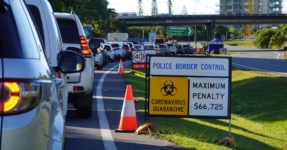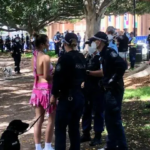PM’s COVID Inquiry Will Be Ineffective, As It Ignores State and Territory Responses

Prime Minister Anthony Albanese and Federal Health Minister Mark Butler have announced a 12-month inquiry into the Covid-19 pandemic response, but it falls well short of public expectations, even though taxpayers will be the ones funding it.
The inquiry’s terms of reference include vaccinations, treatments and key medical supplies to Australians, mental health support for those impacted by Covid-19 and lockdowns, financial support for individuals and businesses, and assistance for Australians abroad.
But here’s the catch – the inquiry will not probe individual state and territory decisions on lockdowns, nor other key decisions made by premiers and those in authority during the pandemic.
And this is why the inquiry is likely to be nearly useless, as the states and territories were the ones passing public health orders which mandated vaccinations, led to communities being virtually imprisoned in their homes, and thereby destroyed businesses, led to the loss of jobs and indeed careers, caused or exacerbated mental health issues and created an environment where Covid-19 vaccine injuries not only were common, but where those who reported them were chose not to take the drugs were demonised and ostracised.
State and Territory leaders exempt
The PM’s decision just doesn’t make sense.
As was often noted during the pandemic, the Australia’s constitution confers the responsibility for health on the nation’s states and territories.
In addition to the flow on effects stated above, police brutality escalated throughout the nation during the directives and human rights were severely curtailed as a result of decisions made by state and territory leaders and health ministers.
It’s difficult to understand why individual premiers won’t be held to account for their decisions – Victorian Premier Daniel Andrews, and Queensland Premier Annastacia Palaszczuk were all particularly power-hungry and heavy handed in their response, although it has not gone unnoticed that they are all members of the Labor Party.
While we can’t exclude Glady Berejiklian’s role in New South Wales at the time, not forgetting the decisions made around the Ruby Princess, which involved multiple “serious”, “inexplicable” and “basic” errors by New South Wales Heath, when allowing the cruise ship to dock and passengers to disembark in Sydney in March 2020, she represented the Liberal Party.
Yet, Mr Alabanese is plowing ahead – because, as he says: “We need a future made in Australia, we need to be more resilient, we need to be more prepared for this in the future, and that’s precisely what this inquiry will be aimed at.”
And this also doesn’t make sense, because, despite actually setting terms of reference which will deliberately avoid key issues such as those mentioned above, by not addressing the decisions of individual premises the inquiry will also fail to address the apparent unwillingness of state and territory governments to work cooperatively during the pandemic, each setting their own rules, which were often poorly communicated, ever-changing and ultimately resulted chaos and confusion, and was a huge side-effect of an already tumultuous situation.
Many Australians might suggest that to be “more prepared” in future one of the key issues for the nation to address is where the power for decision-making around an emergency health crisis lie, and how to ensure the states and territories are able to coordinate a response that doesn’t severely impact the civil liberties of citizens.
Heath issues
The inquiry will focus on examining the Morrison Government’s federal government’s response to the pandemic, including: Governance issues, including international border closures, support, including financial support for business, community and individuals, along with the economic impact – labor shortages, supply chain disruptions and transport issues, and future preparedness.
The terms of reference around health and vaccines is very broad, stating a review of:
- Key health response measures (for example across COVID-19 vaccinations and treatments, key medical supplies such as personal protective equipment, quarantine facilities, and public health messaging).
- Broader health supports for people impacted by COVID-19 and/or lockdowns (for example mental health and suicide prevention supports, and access to screening and other preventive health measures).
Vaccination Injuries
It’s not clear whether the inquiry will consider vaccination injury which to date has been largely ignored in Australia, and yet continues to be a major issue, particularly the provision of adequate financial support for those people who have suffered adverse health effects of the vaccine.
In fact, it is not even possible to access easily publicly available data. The most recent published figures, from November 2022, show the Department of Health received 3071 claims through the federal compensation scheme with 263 determined as payable or not payable, while 1471 applications were waiting on additional information and 166 had been withdrawn.
Many people who have not had a satisfactory level of assistance through the Federal Scheme have now signed up to the Covid Vaccination Class Action, hoping to achieve compensation through the courts.
According to the most current TGA vaccine safety report (September 2023) a total of 68,683,861 doses have been administered and there have been 139,506 adverse event reports.
Pfizer has had the most reports (81,298) followed by AstraZeneca (48,721) and Moderna (7477). It’s possible to consider the fact that the most adverse effects are attributed to Pfizer, because it has been the most widely available vaccination.
Community consultation process
All of us are invited to provide input, via the public consultation process – more information on this process will be available soon. The Inquiry will run for 12 months, with a final report to be delivered by 30 September 2024.







